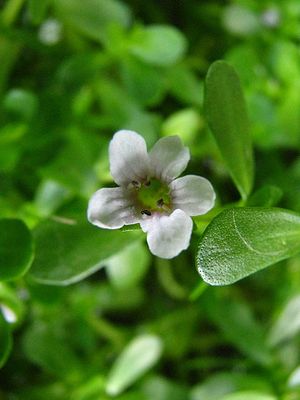Note: This is a project under development. The articles on this wiki are just being initiated and broadly incomplete. You can Help creating new pages.
Bacopa monnieri - Brahmi
It is a non-aromatic herb. The leaves of this plant are succulent, oblong and 4–6 mm (0.16–0.24 in) thick. Leaves are oblanceolate and are arranged oppositely on the stem. The flowers are small, actinomorphic and white, with four to five petals. Its ability to grow in water makes it a popular aquarium plant. It can even grow in slightly brackish conditions. Propagation is often achieved through cuttings.
The whole herb is used medicinally in India in a variety of ways. It is grown as a medicinal crop and is being research for antioxidant properties, to help the nervous system, and to improve memory and mental functions.
Bacopa [1] is a genus of 70–100 aquatic plants belonging to the family Plantaginaceae. It is commonly known as Waterhyssop (or Water Hyssop, though this is more misleading as Bacopa is not very closely related to hyssop but simply has a somewhat similar appearance)
Description
They are annual or perennial, with decumbent or erect stems. The leaves are opposite or whorled, and sessile. The leaf blade is regular, round to linear, and the venation is palmate or pinnate. Its stems are hairy or smooth. The flowers are produced solitary or in pairs from leaf axils, usually radially symmetrical, with five sepals and five petals, and they are usually white, blue, or purple. Dispersal and propagation is by seeds and stem fragments. Crushed leaves have a distinctive 'lemon' scent.
Uses
Bacopa monnieri, syn. Herpestis monniera, is important in Ayurvedic medicine and has been used, particularly in India, for several thousand years in the belief that it helps mental functioning, including comprehension (Dhi), memory (Dhriti), and recollection (Smriti).
